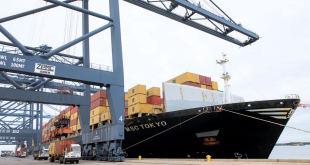Many importers of fast-consuming goods like cosmetics, liquor, mobile phones and cars under nine seats are blasting the new import restriction policy which took effect last Wednesday and left them no time to prepare.
According to the Decision No. 197/TB-BCT of the Ministry of Industry and Trade issued on May 6, shipment arrivals of imports of the three non-essential items, mobile phones, cosmetics and liquors, will only be allowed at ports in HCMC, Danang, Hai Phong.
In addition, importers will be required to provide authorization documents from producers which must be legalized by Vietnamese embassies overseas.
Tran Quoc Hung, managing director of Nhan Viet Company, an authorized importer and distributor of a French-based cosmetics brand, told Saigon Times Daily via phone that this requirement means that he has to wait a few more weeks to get permission for every new product line.
The sudden announcement could see him lose substantial business during the most profitable time of the year, the year-end season.
“Import plans for the year-end season, starting in October, must be completed four to five months before the cargo is shipped and they can’t be changed. The decision came out suddenly and made us unable to submit required papers on time, hence customs clearance will be prolonged and cause us to miss a lot of business opportunities,” he said.
Dinh Anh Huan, general director of mobile phone retail chain, The gioi di dong, said the new regulation will have a heavy impact on his business because of the prolonged import procedures and heavy costs.
“A large majority of our products are from China and usually are transported by air. The shipment will take a few days longer than it used to,” Huan said.
In addition, the requirement for certification by the Vietnamese embassy at the country where the cargo is embarked will also take more time and have high costs for importers.
“The whole procedure will take at least a month and the cost for it will account for 2 percent of the sales price,” he said.
According to economist Le Dang Doanh, this measure is being brought in by the Government in an effort to fight against the rising trade deficit that has climbed to US$6.6 billion in the first five months of this year.
“I think the Government should use economic tools like special consumption tax that will increase the price that consumers have to pay for the item and make them think more carefully before deciding to splash out on lavish goods, instead of using administrative measures,” he said.
According to Doanh, administrative measures are likely to cause a negative impact on importers and the investment environment, and escalate bureaucracy.
Many automobile importers were also hit in the government’s move to restrict imports and narrow the trade deficit.
Last month, 70 importers of automobiles signed a petition requesting the government to reconsider the newly published circular 20 that will come into force on June 26.
Under this circular, importers have to supplement more procedures on trading vehicles under nine seats, including a letter of attorney from producers, contracts legalized by Vietnamese diplomatic offices overseas as well as maintenance facility certificates granted by the Ministry of Transport.
The petition said the new rule would force numerous companies and showrooms to shut down their businesses as they are unable to fulfill the requirements.
“The whole market will be taken over by car joint-ventures, the ones that have authorization documents”, it said.
Nevertheless, the ministry insisted on the necessity to require car importers to disclose the legal origins of their products because consumers need to be protected.
Nguyen Thanh Bien, deputy minister of Industry and Trade, affirmed that the new regulations aimed at controlling imports and exports in order to protect consumers without violating WTO commitments, according to local newspapers.
According to him, around 1,700 companies have been importing cars of less than nine seats, with a total of 30,000 units per year, and this is too much for such a small market like Vietnam and that the number of importers needs to be slashed.
Matthias Duhn, Executive Director of European Chamber of Commerce in Vietnam (Eurocham) said he was concerned with Notice 197 regarding the imports of wine, spirits, cosmetics and mobile phones, and of Decision 1380 that lists goods that are not encouraged for imports.
“These measures cover a significant part of EU exports to Vietnam, including products whose tariffs are bound under WTO,” he said.
Source: Tuoi Tre
 Vietnam Seaports Association
Vietnam Seaports Association




